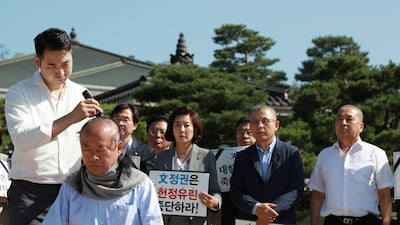The deputy speaker of South Korea's parliament joined a growing band of politicians on Wednesday who have shaved their heads in a protest against a new justice minister whose family is being investigated for suspected wrongdoing.
President Moon Jae-in appointed Cho Kuk on September 9 after weeks of public protests, parliamentary debate and media speculation about allegations his daughter had unfairly received favourable treatment from her university.
"It has become clear that Cho Kuk cannot be the leader of reform," the deputy speaker, Lee Ju-young, told reporters as he sat outside the gate of the presidential Blue House to have his head shaved, a gesture of protest in South Korea.
Mr Lee called for Mr Cho to step down.
"The people's stern order is for him to resign immediately and be investigated," said Mr Lee, who was joined by an opposition member of parliament having his head shaved. Eight members of parliament have had their heads shaved.
The controversy centres on media reports of scholarships and other academic perks granted to Mr Cho's daughter, benefits that allegedly did not reflect her academic performance.
The prosecutors' office has been investigating the family but has declined to comment.
The scandal has struck a chord in South Korea, where young people, who compete fiercely through school and university, are increasingly scrambling for positions in a slack job market in a system they see as plagued by unfairness and bias in favour of the elite.
Mr Cho, in a parliamentary confirmation hearing on Friday, did not deny his daughter's academic perks. He expressed his "deepest apologies to the younger generation" for the disappointment that he caused them.
His 28-year-old daughter has not been identified in South Korean media and she has made no public comment on the controversy.
Mr Cho is a legal scholar with a reputation as a progressive and was Mr Moon's top aide for legal affairs.
Mr Moon has called him the ideal person to carry out reforms at the justice ministry and of the prosecution system. Critics have long accused the judiciary of being susceptible to political pressure.
Mr Cho, who as justice minister supervises the prosecutors' office, has vowed not to become involved in the investigation of his family, saying he would not receive reports on it.
The liberal Mr Moon took office in 2017 after the impeachment for corruption of his conservative predecessor, who came from one of South Korea's most prominent political families.
Mr Moon promised change, including equal opportunities, but his ratings have been sliding recently as the economy struggles.
In a survey of 1,009 Koreans by pollster Korea Research International, 57.1 per cent of people said Mr Moon's appointment of Mr Cho as justice minister was wrong, compared with 36.3 per cent who approved.
The same poll found that 51.7 per cent of those surveyed disapproved of Moon's performance, while 44.5 per cent approved.

